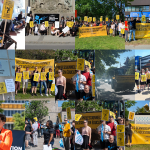La négociation aux tables du Nord a suivi sensiblement le même cheminement que pour les autres tables professionnelles. Nous étions conviés le mercredi 25 mars dernier à reprendre les négociations à un rythme accéléré, et ce, malgré que nous ayons de manière commune accepté de suspendre les négociations jusqu’au début avril. L’objectif de l’exercice auquel nous demandait de participer la partie patronale était de conclure d’une convention collective dans les prochains jours. Nous souhaitions avoir plus d’informations sur le contexte des discussions à venir et surtout, savoir quelles conditions allaient nous être imposées, si nous acceptions ce blitz. Pour ce faire, nous avons rencontré les deux tables du Nord (Crie et Kativik) le lendemain, soit le jeudi 26 mars.
Nous avons à ce moment indiqué à la partie patronale que nous devions valider avec nos instances si nous avions le mandat d’accepter de négocier rapidement les matières sectorielles. Pour ce faire nous voulions avoir le plus d’informations possible. La partie patronale nous a indiqué que toutes les demandes syndicales pouvaient faire l’objet de discussions, autant les demandes à incidences monétaires que celles à coût nul. Aussi, nous n’avions pas de limite de nombre de demandes qui pouvaient être identifiées comme prioritaires, mais puisque le mandat était de négocier rapidement, nous devions être sélectifs. En ce qui concerne la date butoir, aucune date n’a été mentionnée, mais il était question de jours, et non de semaines. La partie patronale assurait avoir tous les mandats pour négocier rapidement.
Nous avons ensuite fait l’exercice de préparer une courte liste de demandes en conseil fédéral. Les demandes identifiées représentaient des demandes équilibrées et réalistes à notre avis, qui pouvaient faire l’objet d’une entente rapidement. Nous avons présenté cette liste le dimanche 29 mars aux deux tables. Nous avons également reçu la liste des demandes patronales prioritaires. Nous avons été très déçus de constater que la grande majorité des demandes patronales se trouvaient encore sur la table, incluant des demandes représentant des reculs significatifs pour nos membres. Nous avons exprimé notre mécontentement aux deux tables. Nous étions également insatisfaits de l’absence de mandats des représentants patronaux sur nos demandes syndicales. Pour nous, l’ensemble de l’attitude de la partie patronale ne s’inscrivait pas dans une véritable démarche de négociation accélérée. Nous avons indiqué attendre un retour rapidement, qui était prévu pour le lendemain, soit le 30 mars. Au moment d’écrire ces lignes, nous n’avons toujours pas eu de retour des porte-paroles patronaux aux tables Crie et Kativik.
Nos actions futures devront donc s’inscrire dans une stratégie globale et coordonnée. Soyez assurés que nous vous tiendrons informés de la suite des choses.
News From the Northern Negotiation Tables P3 & P4
Negotiations at the northern tables followed much the same path as for the P1 and P2 tables. We were invited on Wednesday, March 25th, to resume negotiations at an accelerated pace, despite the common agreement that we would suspend the negotiations until early April. The objective of the exercise in which we were asked to participate by the employer side was to conclude a collective agreement in the coming days. We wanted to know more about the context of the upcoming discussions, and, above all, what conditions would be imposed on us if we accepted this blitz. To do this, we met with the two northern tables (Cree and Kativik) the following day on Thursday, March 26th.
At that time, we indicated to the employer that we had to validate with our federation as to whether we had the mandate to agree to negotiate sectoral matters quickly. We wanted to have as much information as possible. The employer side informed us that all union demands could be discussed, both monetary and those at zero-cost. Also, we did not have a limit on the number of demands,” that could be identified as priorities, but since the mandate was to negotiate quickly, we had to be selective. With respect to the deadline, no date was mentioned, but it was a question of days, not weeks. The employer side ensured that it had all the mandates to negotiate quickly.
We then did the exercise of preparing a “short list “of demands with the Conseil féderal de négociation. The identified demands were balanced and realistic in our view, and which could be agreed upon quickly. We presented this list on Sunday, March 29th at both tables. We also received a priority list of demands from the employer. We were very disappointed to find that the vast majority of employer demands were still on the table, including requests representing significant setbacks for our members. We expressed our displeasure at both tables. In addition, we were also dissatisfied with the lack of mandates on the part of employers to negotiate our demands. We found that the attitude of the employer was not one of a genuine accelerated negotiation process. We indicated that we expected a quick return, which was scheduled for the next day, March 30th. At the time of writing this, we still have not heard back from the representatives of the Cree and Kativik tables.
Our future actions will therefore have to be part of a comprehensive and coordinated strategy. Rest assured that we will keep you informed of what will happen next.







